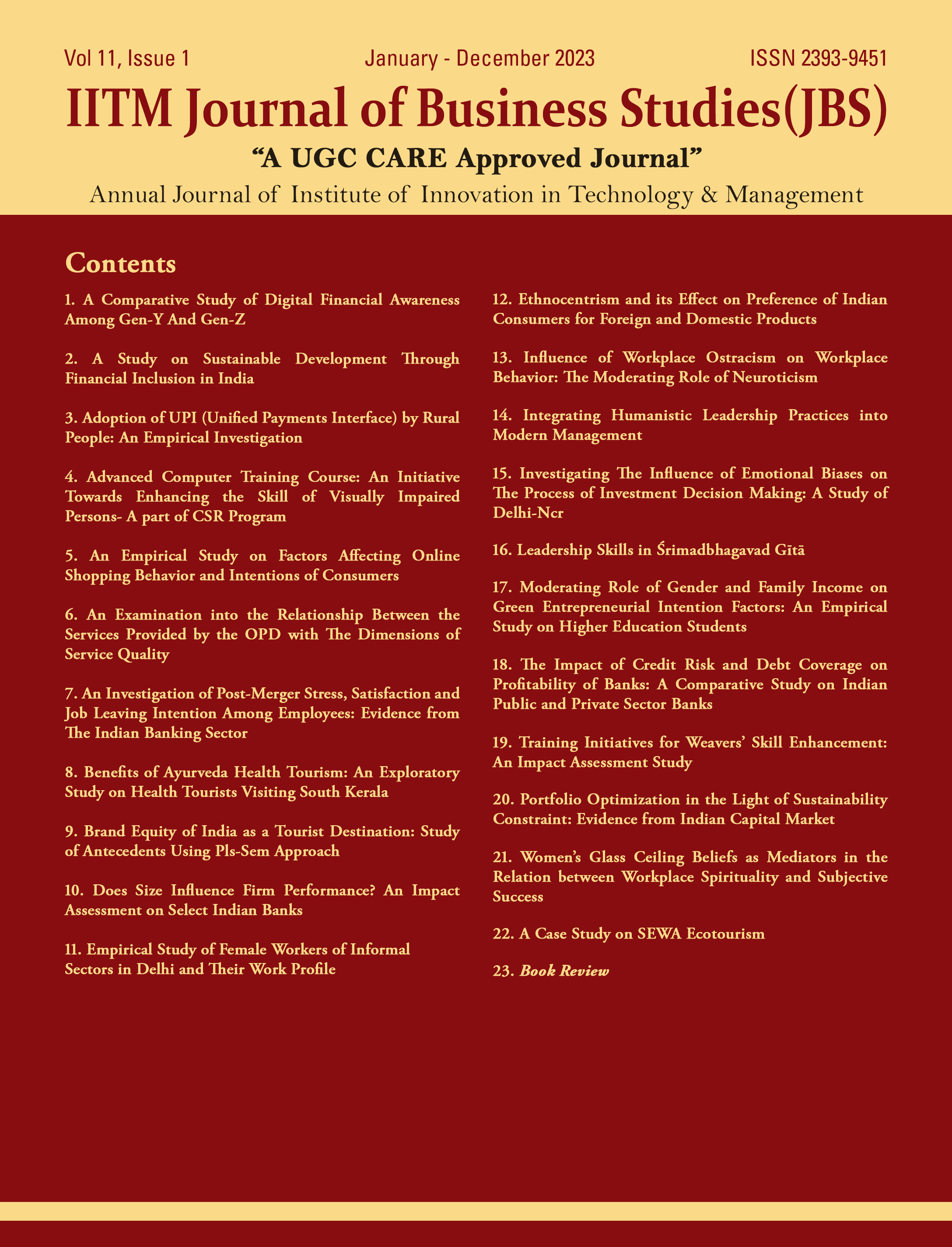DEMOGRAPHIC DYNAMICS OF FINTECH ADOPTION: EXPLORING PATTERNS AND PREFERENCES IN AN EMERGING ECONOMY
DOI:
https://doi.org/10.48165/iitmjbs.2024.SI.17Keywords:
Fintech adoption, demographic factors, emerging economies, financial inclusion, technological innovation, multidimensional approach Top of FormAbstract
In recent years, the global financial landscape has undergone a significant transformation propelled by the rapid proliferation of Financial Technology (Fintech). This technological revolution has not only reshaped traditional financial services but has also democratized access to financial products and services, ushering in a new era of financial inclusion and empowerment. Understanding the underlying demographic dynamics behind Fintech adoption has become increasingly crucial for policymakers, financial institutions, and market participants alike, especially within emerging economies. This research aims to delve into the intricate interplay between demographic factors and Fintech adoption within the context of emerging economies. Through a multidimensional approach encompassing quantitative analysis and theoretical frameworks, the study endeavors to investigate the patterns and preferences across different demographic segments. By analyzing data from 15 emerging countries representing diverse regions across the globe, the research seeks to uncover insights into the drivers and barriers influencing Fintech adoption.
References
Ahmed, Ali Saeed, Mukesh Kumar, and Mahmood Asad Moh’d Ali. 2020. Adoption of FinTech and Future Perspective: Empirical Evidence from Bahrain on Digital Wallets. Paper presented at 2020 International Conference on Decision Aid Sciences and Application (DASA), Sakheer, Bahrain, November 8–9; pp. 751–55.
Al-Okaily, M., Al Natour, A. R., Shishan, F., Al-Dmour, A., Alghazzawi, R., &Alsharairi, M. (2021). Sustainable FinTech innovation orientation: A moderated model. Sustainability, 13(24), 13591.
Alshater, M. M., Saba, I., Supriani, I., & Rabbani, M. R. (2022). Fintech in islamic finance literature: A review. Heliyon, 8(9).
Alwi, Shaliza, Rabiatul Munirah Alpandi, Masrina Nadia Mohd Salleh, Irfah Najihah Basir, and Farrah Fawzia Md Ariff. 2019. An Empirical Study on the Customers’ Satisfaction
on Fintech Mobile Payment Services in Malaysia. International Journal of AdvancedScience and Technology 28: 390–400.
Baber, H. (2020). FinTech, Crowdfunding and Customer Retention in Islamic Banks. Vision: The Journal of Business Perspective, 24(3), 260–268. https://doi.
org/10.1177/0972262919869765
Buchak, G., Matvos, G., Piskorski, T., & Seru, A. (2018). Fintech, regulatory arbitrage, and the rise of shadow banks. Journal of Financial Economics, 130(3), 453–483.
Clements, Ryan. 2020. Financial Inclusion in British Columbia: Evaluating the Role of Fintech (SSRN Scholarly Paper No. 3775933).
Daragmeh, Ahmad, Csaba Lentner, and Judit Sági. 2021. FinTech Payments in the Era of COVID-19: Factors Influencing Behavioral
Ediagbonya, V., & Tioluwani, C. (2023). The role of fintech in driving financial inclusion in developing and emerging markets: Issues, challenges and prospects. Technological Sustainability, 2(1), 100–119. https://doi.
org/10.1108/TECHS-10-2021-0017
Gerlach, Johannes M., and Julia K. T. Lutz. 2021. Digital Financial Advice Solutions— Evidence on Factors Affecting the Future Usage Intention and the Moderating Effect of Experience. Journal of Economics and Business 117: 106009.
Haddad, C., &Hornuf, L. (2019). The emergence of the global fintech market: Economic and technological determinants. Small Business Economics, 53(1), 81–105.
Hasan, R., Hassan, M. K., & Aliyu, S. (2020). Fintech and Islamic finance: Literature review and research agenda. International Journal of Islamic Economics and Finance (IJIEF), 3(1), 75–94.
Jin, Chua Chang, Lim Chee Seong, and Aye Aye Khin. 2019. Factors Affecting the Consumer
Acceptance towards Fintech Products and Services in Malaysia. International Journal of Asian Social Science 9: 59–65.
Kakinuma, Yosuke. 2022. Financial Literacy and Quality of Life: A Moderated Mediation Approach of Fintech Adoption and Leisure. International Journal of Social Economics 49: 1713–26
Lee, I., & Shin, Y. J. (2018). Fintech: Ecosystem, business models, investment decisions, and challenges. Business Horizons, 61(1), 35–46.
Mu, Hong-Lei, and Young-Chan Lee. 2017. An Application of Fuzzy AHP and TOPSIS Methodology for Ranking the Factors Influencing FinTech Adoption Intention: A Comparative Study of China and Korea. Journal of Service Research and Studies 7: 51–68.
Nawayseh, Mohammad. 2020. FinTech in COVID-19 and Beyond: What Factors Are Affecting Customers’ Choice of FinTech Applications, Journal of Open Innovation Technology Market and Complexity 6: 153.
Pedrosa, Jose, and Quy-Toan Do. 2011. Geographic Distance and Credit Market Access in Niger. African Development Review 23: 289–99.
Takeda, A., & Ito, Y. (2021). A review of FinTech research. International Journal of Technology Management, 86(1), 67–88.
Xie, Jianli, Liying Ye, Wei Huang, and Min Ye. 2021. Understanding FinTech Platform Adoption: Impacts of Perceived Value and Perceived Risk. Journal of Theoretical and Applied Electronic Commerce Research 16: 1893–1911.
Zhang, B. Z., Ashta, A., & Barton, M. E. (2021a). Do FinTech and financial incumbents have different experiences and perspectives on the adoption of artificial intelligence? Strategic Change, 30(3), 223–234.
Zhang, B. Z., Ashta, A., & Barton, M. E. (2021b). Do FinTech and financial incumbents have different experiences and perspectives on the adoption of artificial intelligence? Strategic Change, 30(3), 223–234.
